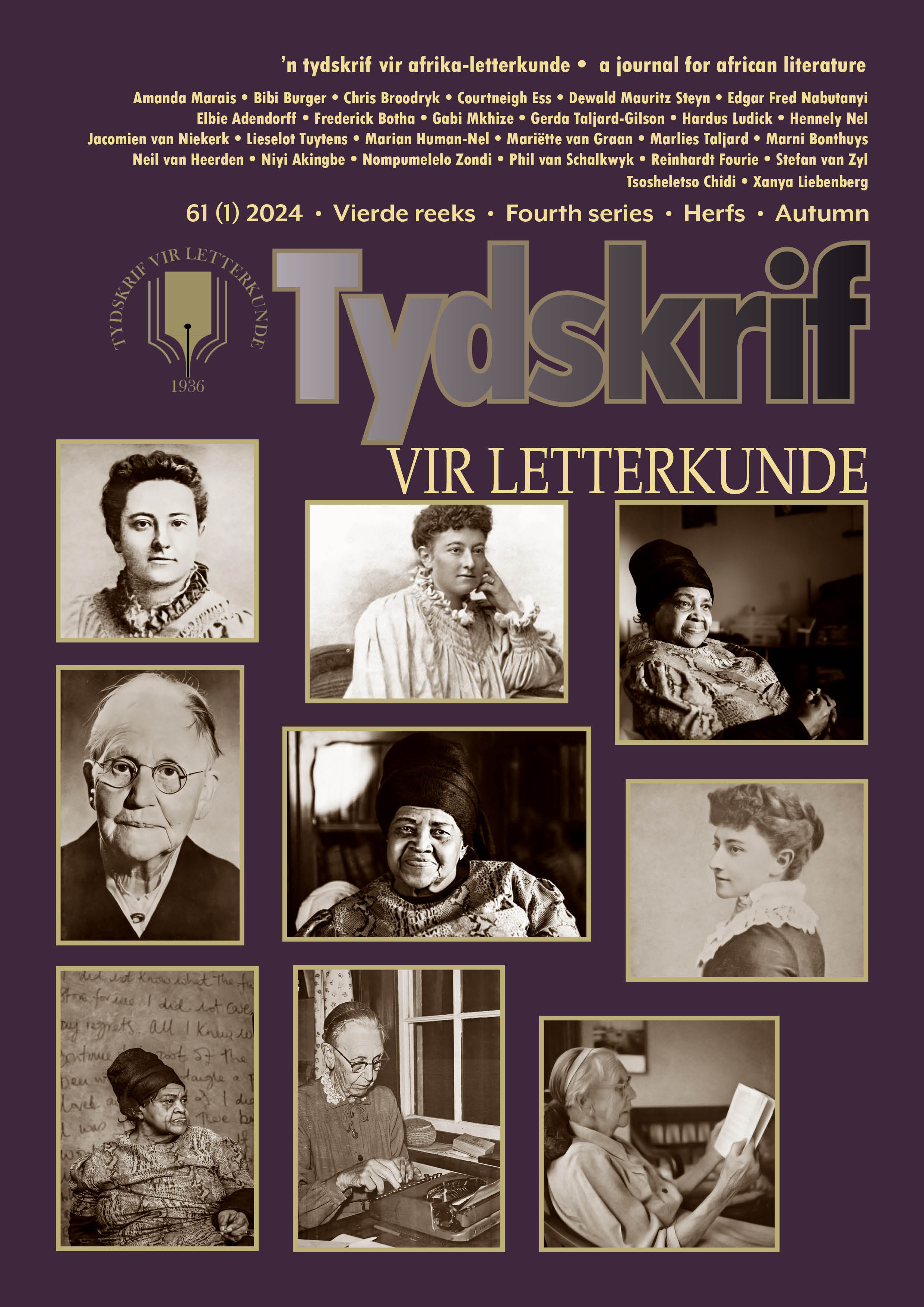Radikaal versus beskeie: Die vroegste vrouestemme teen patriargie in die Suid-Afrikaanse literatuursisteem
DOI:
https://doi.org/10.17159/tl.v61i1.16087Keywords:
South African literature in English, Afrikaans literature, patriarchy, stereotyping, gender politicsAbstract
This article explores similar social experiences of South Africa in the English and Afrikaans literary systems respectively. It investigates the reflection of patriarchy as an ideological presupposition of South African society in the earliest writings of two South African writers, Olive Schreiner (1855–1920) and Maria Elizabeth Rothmann (1875–1975) (known as M. E. R.). In doing this, it offers a discussion of how these women’s involvement in South African politics sought to address the situation that political rule during the late 1800s and early 1900s created for South African women in the broader context of the South African War. The practice of gender politics as a response to these social experiences is discussed, while the contribution of Schreiner’s radical voice to the stereotyping of the Afrikaner woman is compared to the modest voice with which M. E. R. fought for the rights of these stereotyped women. The article concludes that the nature of, and similarities and differences between their feminist voices determined Schreiner’s and M. E. R.’s contribution to their respective literary systems, as well as their contribution to English and Afrikaans prose.
Downloads
References
Bonthuys, Marni. “CFP: Feminism and South Africa literatures.” African Literature Association. 19 Okt. 2022. https://africanlit.org/cfp-feminisms-and-south-african-literatures/.
Brodzki, Bella & Celeste Schenk, reds. Life/lines: theorizing women’s autobiography. Cornell U P, 1988. https://doi.org/10.7591/9781501745560. DOI: https://doi.org/10.7591/9781501745560
Clayton, Cherry. “Introduction.” The Story of an African Farm, by Olive Schreiner. AD Donker, 2004, pp. 7–20.
Cloete, T. T., red. Literêre terme en teorieë. Haum-Literêr, 1992.
Coetzee, Ampie. Letterkunde & krisis: ’n honderd jaar Afrikaanse letterkunde en Afrikanernasionalisme. Taurus, 1990.
De Beauvoir, Simone. The Second Sex. Translated by H. M. Parsley. Penguin, 1972.
De Jong, Marianne. “Feminisme.” Literêre terme en teorieë, geredigeer deur T.T. Cloete. HAUM-Literêr, 1992, pp. 123–8.
De Jong, Marianne & Jessica Murray. “Feminisme.” Literêre terme en teorieë. 2017. https://www.litterm.co.za/index.php/f/1564-feminisme-2.
De Villiers, Heidi. “D. F. Malherbe (1881–1969).” Perspektief en Profiel. Deel 1, geredigeer deur H. P. van Coller. J. L. van Schaik, 1998, pp. 649–56.
De Vries, Abraham H. Die Afrikaanse kortverhaalboek. Human & Rousseau, 2012.
Dekker, Gerrit. Afrikaanse literatuurgeskiedenis. Nasionale Pers, 1947.
Du Toit, Marijke. “The Domesticity of Afrikaner Nationalism: Volksmoeders and the ACVV, 1904–1929.” Journal of Southern African Studies vol. 29, no. 1, 2003, pp. 155–76. DOI: https://doi.org/10.1080/0305707032000060485
Friedlander, Zelda, red. Until the heart changes. A garland for Olive Schreiner. Tafelberg, 1967.
Gilfillan, J. M. “Griet skryf ’n sprokie. Van stilswye tot kreet.” Stilet vol. 6, no. 2, 1994, pp. 97–105.
Giliomee, Hermann. Die Afrikaners. ’n Biografie. Tafelberg, 2004.
Greeff, Rachelle. “No angst whatsoener”. Sash vol. 35, no. 3, 1993, p. 42.
Gregory, Jessica. “Olive Schreiner: Feminism from the Cape Colony.” British Library English and Drama Blog. 21 Jun. 2021. https://blogs.bl.uk/english-and-drama/2021/06/olive-schreiner-feminism-from-the-cape-colony.html.
Human-Nel, M. “Die impak van sosiopolitieke verandering op die plek van vroueskrywers in die Afrikaanse literêre kanon.” Diss. U Freestate, 2009. http://hdl.handle.net/11660/1076.
Kannemeyer, J. C. Die Afrikaanse literatuur. 1652–1987. Human & Rousseau, 1988.
Krebs, Paula. “Olive Schreiner’s racialization of South Africa.” Victorian Studies vol. 40, no. 3, 1997, pp. 427–44.
Lippmann, Walter. Public opinion. Macmillan, 1922.
McClintock, Anne. “Olive (Emilie Albertina) Schreiner.” British Writers, geredigeer deur George Stade. Charles Scribner’s Sons, 1992. https://dept.english.wisc.edu/amcclintock/schreiner.htm.
Nienaber, P. J. Perspektief en Profiel. ’n Geskiedenis van die Afrikaanse letterkunde. Afrikaanse Pers, 195l.
Nienaber-Luitingh, M. “M. E. R. (1875–1975).” Perspektief en Profiel. Deel 1, geredigeer deur H. P. van Coller. J. L. van Schaik, 1998, pp. 684–93.
Nieuwoudt, Ilze. “Maria Elizabeth Charlotte Rothmann (M. E. R.).” Weet. Afrikaanse e-naslaangids vir leerders. 2022. https://weet.co.za/afrikaans/maria-elizabeth-charlotte-rothmann-m-e-r/.
Roos, Henriette. “Perspektief op die Afrikaanse prosa van die twintigste eeu.” Perspektief en Profiel. Deel 1, geredigeer deur H. P. van Coller. J. L. van Schaik, 1998, pp. 43–104.
M. E. R. “Die boodskap”. Die Afrikaanse kortverhaalboek, geredigeer deur Abraham. H. de Vries. Human & Rousseau, 2012, pp. 23–30.
Schoeman, Karel. Olive Schreiner: ’n Lewe in Suid-Afrika (1855–1881). Juta, 1989.
Schreiner, Olive. The Story of an African Farm. AD Donker, 2004.
Showalter, Elaine. 1975. “Review essay. Literary criticism.” Signs vol. 1, no. 2, 1975, pp. 435–60. DOI: https://doi.org/10.1086/493231
The Journalist. “M. E. Rothmann.” Vintage feminist. 2014. https://www.thejournalist.org.za/pioneers/m-e-rothmann-vintage-feminist/.
Snyman, Dana. “Dana Snyman: Op Ta’Miem se spoor.” Blik Dit. 16 Sep. 2012. https://blikdit.wordpress.com/2012/09/16/dana-snyman-op-ta-miem-se-spoor/.
Steyn, J. C. Die 100 jaar van M. E. R. Tafelberg, 2004.
Van Coller, H. P. “Die Afrikaanse plaasroman as ideologiese refleksie van die politieke en sosiale werklikheid in Suid-Afrika.” Stilet vol. 7, no. 2, 1995, pp. 22–31.
Van der Merwe, Chris. Breaking Barriers: Stereotypes and the changing of values in Afrikaans writing. 1875–1990. Rodopi, 1994. https://doi.org/10.1163/9789004650114. DOI: https://doi.org/10.1163/9789004650114
Van Niekerk, Annemarie. “Die Afrikaanse vroueskrywer—van egotekse tot postmodernisme (18de eeu–1996).” Perspektief en Profiel. Deel 1, geredigeer deur H. P. van Coller. J. L. van Schaik, 1999, pp. 305–443.
Viljoen, Hein. “Literatuursosiologie.” Literêre terme en teorieë. 2017. https://www.litterm.co.za/2010/09/28/literatuursosiologie/.
Viljoen, Louise. “Die 100 jaar van M. E. R. Eerlike bibliografie is dié vrou gewis waardig.” Rapport, 13 Jun. 2004, p. 17.
Viljoen, Louise. Ons ongehoorde soort. Sun, 2009.
Vincent, Louise. “A cake of soap: The Volksmoeder Ideology and Afrikaner Women’s Campaign for the vote.” The International Journal of African Historical Studies vol 32, no. 1, 1999, pp. 1– 17. DOI: https://doi.org/10.2307/220803
Downloads
Published
Issue
Section
License
Copyright (c) 2024 Tydskrif vir Letterkunde

This work is licensed under a Creative Commons Attribution-ShareAlike 4.0 International License.


 https://orcid.org/0000-0001-6465-6584
https://orcid.org/0000-0001-6465-6584


.png)